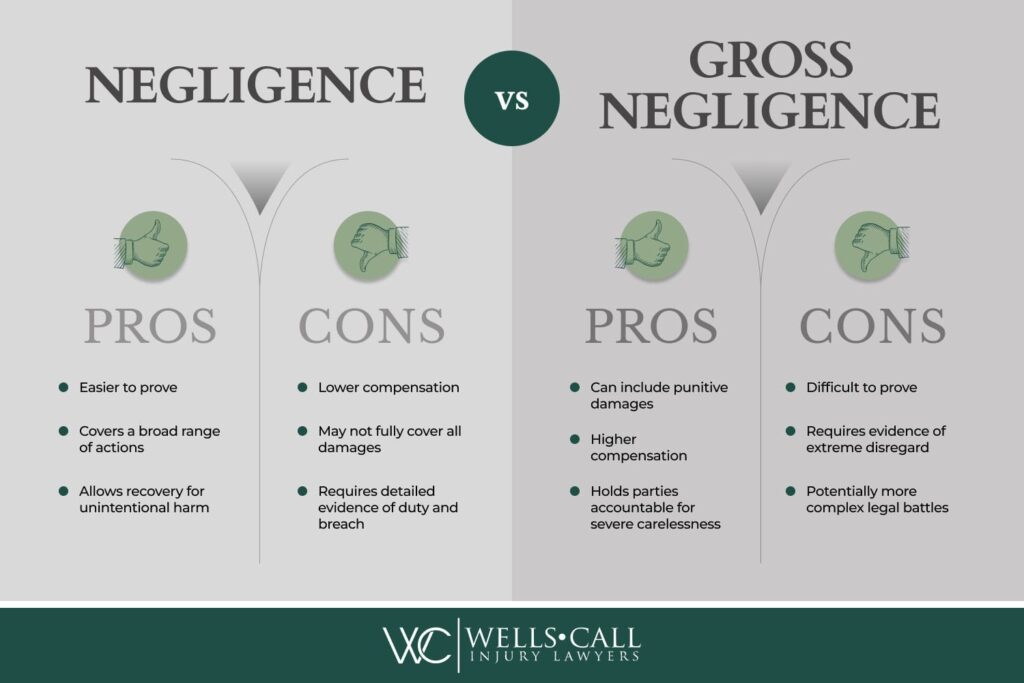Negligence is a legal concept that is the cornerstone of personal injury lawsuits. California law also recognizes gross negligence, which is related but not the same.
If you have a personal injury case, it is important to understand the differences between gross negligence vs. negligence and how that distinction can affect your legal claim.
Negligence vs Gross Negligence: What’s the Difference?

What Is Ordinary Negligence?
Ordinary negligence, in a nutshell, is carelessness. When someone is negligent, it means they’ve acted in a way that a reasonable person would not. In other words, they have failed to take reasonable precautions to avoid endangering someone else.
You prove negligence by showing that:
- The negligent person owed you a duty of care;
- They breached that duty by failing to act in a reasonable manner; and
- Their conduct caused your injuries or damages.
Someone does not have to intend to harm another person to be guilty of negligence. Someone injured because of another person’s negligence can recover compensation for damages related to those injuries.
Possible compensation could include:
- Past and future medical expenses;
- Lost wages and earning potential;
- Property damage; and
- Pain and suffering.
Examples of ordinary negligence include people texting while walking on a busy sidewalk, running a stop sign, and failing to clean up a spill inside a store where someone could slip.
In these cases, the negligent party likely didn’t mean to cause harm. But if they acted carelessly, their intent doesn’t matter—they are liable for the damages caused by their unintentional negligence.
In such cases, people generally recover their damages through a personal injury lawsuit or settlement.
What Is Gross Negligence?
In California law, gross negligence means that a person’s actions showed an extreme lack of care, far beyond ordinary negligence. It indicates a blatant disregard for the safety or lives of others.
It is more egregious than simple carelessness, but it does not rise to the level of malicious intent to harm.
In California, negligence denotes a lack of reasonable care, leading to harm. Gross negligence escalates this, indicating an extreme disregard, extending beyond ordinary negligence.
According to California case law, the damages awarded are often higher in personal injury claims involving gross negligence than in cases of ordinary negligence.
They may also include punitive damages to punish the defendant for their conduct.
Examples of gross negligence include:
- Speeding through an area with high pedestrian traffic;
- Failing to conduct required safety inspections or preventative maintenance for dangerous equipment; or
- Leaving a surgical instrument inside a patient’s body.
In the 2007 case cited above, the California Supreme Court held that someone may sue a wrongdoer for their gross negligence even if they signed a liability waiver assuming the risks of a situation.
Where that waiver might bar victims from bringing a claim for ordinary negligence, it does not let perpetrators off the hook for grossly negligent behavior.
Wells Call Injury Lawyers Are Here to Help
Determining whether you have a cause of action to pursue compensation for someone’s negligent act could be difficult.
It can be even harder to prove that it was gross negligence—as opposed to ordinary negligence—especially where a liability waiver was involved.
Wells Call Injury Lawyers are experienced personal injury attorneys serving clients in California. We have a strong record of success in helping people with their negligence claims, and we can help you with your case.
Contact us today to schedule a consultation.
Learn what sets us apart:

